Want to throw the perfect kids’ party? Not all parties are created equal – your child’s age is one of the most important considerations as you plan a party.
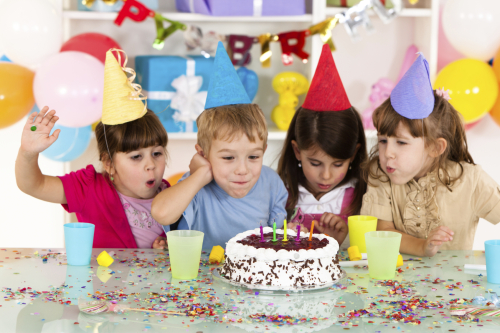
Here’s a guideline for basic party planning tips at any age:
Party Planning for Babies (ages 1 or 2)
First, the basics. How many guests should be invited to a very young child’s birthday party? Babies become overwhelmed easily, and some can’t tolerate large crowds or groups of unfamiliar faces. Of course you want to celebrate your little sweetie’s first birthday milestone with lots of people, but it’s best to keep the festivities to immediate family and close friends. If you invite people who baby recognizes and with whom she has regular interaction, it will be less overwhelming and your baby could be less likely to become agitated or overstimulated.
Second, choose the timing strategically. The last thing you want is a cranky baby while you’re trying to celebrate this event. After all, those photo ops just won’t be the same with a screaming-faced baby! Plan your party that avoids your child’s usual nap times, and definitely make sure that the festivities are finished well in time to have some winding down and quiet time before bed. Unless your child is a morning napper, mornings might be a good time to throw a celebration because your baby will feel fresh and ready to party.
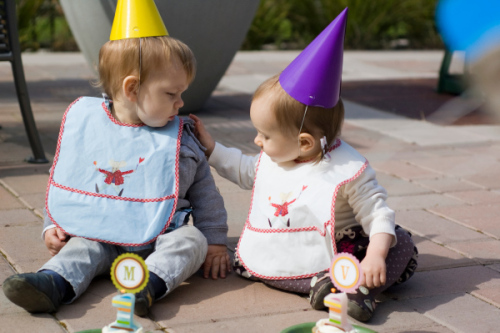
The next consideration is where the party will take place. If your home can accommodate the number of guests you’ve invited, it might be the best environment for a party because it’s where your baby feels most comfortable. Also, if your baby is crawling or toddling, you know that you can put her down and she is in a baby-proofed space, which allows you more ability to enjoy the party and socialize with your guests. If you don’t want to have the party at home, a baby-friendly casual restaurant might be a good option.
Finally, what food does one serve at a baby’s birthday party? Finger foods that are suitable for both children and adults are always a good option – things like small cheese cubes, cut-up fruit or mini-sandwiches are easy and enjoyable for everyone. If you have a few small children or babies in attendance, try to avoid any foods that might be choking hazards (nuts, grapes, cut-up hot dogs, popcorn, etc.).
The best part? Cake!! Everyone loves to see a baby smooshing cake into her face for that first delightful bite. That’s why some parents make or buy a “smash cake” – a small cake designed just for baby. Therefore, there’s one cake for celebrating (and eating) and another just for smashing.
For more tricks for planning a one- or two-year-old birthday party, check these useful tips from Babycentre and Babble.
Party Planning for Preschoolers (ages 3-4)
The rule of thumb for a preschool party is to invite one guest for each year of age, so a three-year-old could invite three friends and a four-year-old could invite four friends, for example. At this stage, parents will usually accompany children to a party (and you should encourage them to do so, because otherwise you become the default child care provider while you’re trying to entertain).
If your preschooler has older siblings, you might consider allowing each sibling to invite one special guest. If you can keep the guest list to close family and friends, it will help keep your numbers low, which will make for a more organized party.
Some preschoolers are still taking afternoon naps, so a morning party would be ideal for this set, too. Even if your child is no longer taking naps, others might miss one if the party is during the afternoon hours, which increases the likelihood of toddler meltdowns.
You don’t need to feel obligated to serve a whole meal to the preschoolers and their parents. Instead, cake and snacks would be more than sufficient. Preschoolers can still choke on small foods, so try to avoid the common hazards but serve food like finger-sandwiches, cut fruit or veggies or chips. If you want to serve something more substantial, pizza is an easy option that most preschoolers will be happy to eat.
It’s a nice idea to have plenty of snacks or pizza available for the parents, too, along with soft drinks or coffee.
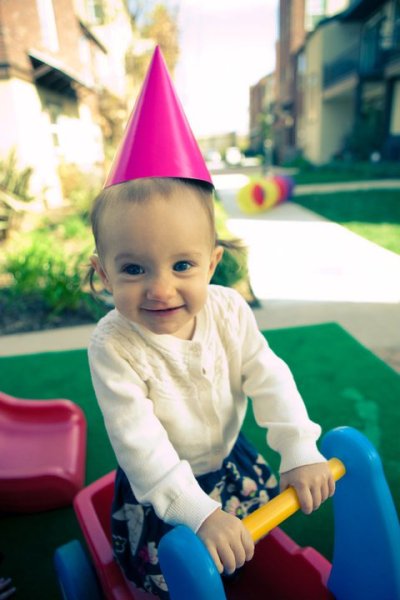
Even if you’re only having a few children, a handful of preschoolers can raise a ruckus anywhere. If you’re fortunate enough to have a big backyard and nice weather, all they need is a few outdoor playthings and they will be happy. But, if that’s not an option, a kid activity like a toddler gym or gymnastics studio might be a fun and affordable venue.
For even more inspiration, visit Storknet, PBS, AboutParenting and Whattoexpect.com.
Party Planning for Ages 5-10
Once your child starts school, he is probably more likely to have formed his own friendships and have specific ideas about what a birthday party entails. When discussing a guest list, the “one guest per year of age” rule can still hold. Or, if your child wants a few more, make sure that the list is designed to include close friends and not exclude any children, in order to avoid hurt feelings and social stigmas. If your child has a small handful of close friends, it’s probably better than attempting to invite the whole class.
By kindergarten, most children no longer require afternoon naps. So, an afternoon party can work just fine – but, be sure to have a definite end time so that children are picked up and can head home well before bedtime. At this age, parties should be kept to two to three hours.
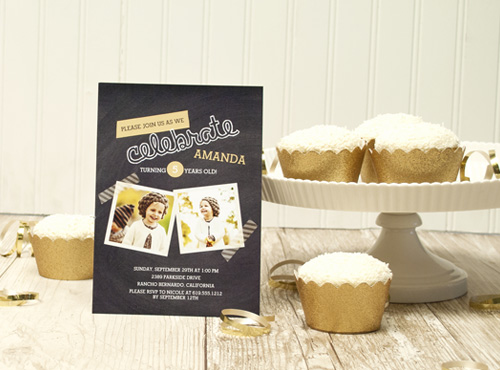
Kids always love cupcakes. They can be easier to serve than a cake because you just hand them out, and there’s no cutting and no forks required. You can have a special cupcake for the birthday child, and light candles and sing just as you would with a full-sized cake. If you are serving lunch or dinner, pizza is always a great bet for this crowd. Because parents don’t usually stick around for parties at this age, be sure to ask each parent ahead of time if a child has any allergies or dietary restrictions.
Another good practice is to ask parents for their mobile phone numbers when kids are dropped off. If an emergency or injury should arise, you should know how to contact each guest’s parent.
By this age, kids have their own ideas about where they want parties to take place. They might be into going to a rock-climbing facility, laser tag or even going to a movie. Establish a budget before you begin planning and let your child know that the activity has to coincide with the number of guests, and plan accordingly.
Parenting, Cozi, RealSimple, Moms Who Think, Kids’ Birthday Parties: Taking the Stress Out of Celebrations and How to Throw a Kid’s Birthday Party on a Budget have some more great ideas that can help you plan the big event.
Party Planning for Tweens (11-12)
Things start to become tricky around this age. Your pre-teen might want minimal involvement from you, but you still need to be engaged in the party planning process. Let your child know that she has to stick within a budget and that you need to approve all guests and activities.
Work together to set a guest list. Under 15 kids would probably be a manageable number, depending on the activity. Time of day becomes less of an issue with older kids, but you do want to check the calendar and be sure that it doesn’t conflict with any major school, community or sports events. Tell your tween that the party must have a definitive beginning and end, and keep it to a few hours. If she’s planning on a sleepover, be sure that you set ground rules that she and her friends are expected to follow.
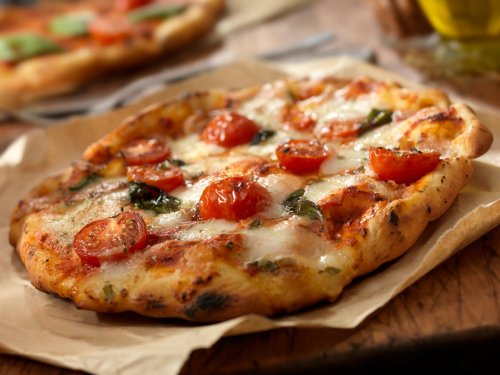
Pizza is still a staple for the preteen crowd. This is a great default food, along with munchies, soft-drinks and cake.
You can work with your preteen to find a venue suitable for the age group – arcades, paintball or a spa party might be fun, depending on your child’s interests.
Want even more to think about? Lots of ideas at TweenParenting, Spoonful, Awesome-Kid-Birthday-Parties.com, and How to Throw a Preteen Party.
Party Planning for Teens
When you’re helping to plan a party for your teen, set some guidelines in order to ensure that the festivities don’t get out of hand. First, have a guest list. Don’t allow drop-ins (i.e. “crashers”) because that can lead to unwanted guests. Where the party is to be held can help determine the number of guests allowed. If you’re expecting a lot of teens to attend, it would be a good idea to ask some other trusted adults to help chaperone. One adult for every 15 to 20 kids would probably be a good number to make sure that everyone is behaving properly.
Set a definite beginning and end time, make sure parents know what those times are, and make kids stick to it. In other words, if a parent expects his teen to be at your house until 11pm, but the teen leaves at nine, that teen might be spending those two hours someplace where the parents wouldn’t want her to be.
Teen parties don’t need as much structure as younger kids’ parties. They want to dance, socialize and hang out. You could rent an inexpensive hall or room, play some music and have some food, and it would be the perfect teen party. You could serve pizzas, giant submarine sandwiches, or just munchies and soft-drinks. Alternately you could designate a venue like Dave and Busters that provides food and games without the childish vibe of a regular arcade. Try to avoid the punch-bowl method for drinks and instead have individual-serving cans or bottled beverages.
The Kids are All Right, ParentingTeens and Sonoma Family Life have some more tips for keeping the reins while still having fun at a teen party.

For any party… relax and have fun! You’re creating memories that will last a lifetime!
